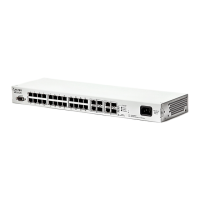198 MES1000, MES2000 Ethernet Switches
The field is used to specify a protocol (or all protocols)
filtration will be based on. The following protocol options are
available: icmp, igmp, ip, tcp, egp, igp, udp, hmp, rdp, idpr,
ipv6, ipv6:rout, ipv6:frag, idrp, rsvp, gre, esp, ah, ipv6:icmp,
eigrp, ospf, ipinip, pim, l2tp, isis, ipip or a protocol number (0–
255).
The ip value is used for all protocols to establish
correspondence.
Defines MAC address of the packet source.
The mask defines the packet source MAC address bits, that
should be ignored. Ignored bits values should be changed to
1s. For example, with the mask, you can define filtering rules
for the MAC address range. To add all MAC addresses that
begin with 00:00:02:AA.хх.хх to the filtering rule, you should
define the 0.0.0.0.FF.FF as the mask value. According to this
mask, the last 16 bits of the MAC address will not be relevant
for analysis.
Defines MAC address of the packet destination.
Address MAC mask of the
destination
A bit mask applied to MAC address of the packet destination.
The mask defines the bits of the MAC address which should be
ignored. "1" should be written to all ignored bites. The mask is
used the same way as the source_mac_wildcard mask.
Defines IP address of the packet source.
Bit mask, that is applied to the packet source IP address. The
mask defines the IP address bits, that should be ignored.
Ignored bits values should be changed to 1s. For example, with
the mask, you can define filtering rules for the IP network. To
add IP network 195.165.0.0 to the filtering rule, you should
define the 0.0.255.255 as the mask value. According to this
mask, the last 16 bits of the IP address will be ignored.
Specify the packet destination IP address.
Destination IP address
mask
Bit mask, that is applied to the packet destination IP address.
The mask defines the IP address bits, that should be ignored.
Ignored bits values should be changed to 1s. The mask is used
by analogy to the source_ip_wildcard mask.
The DSCP field in L3 header
Defines the value of the diffserv DSCP field. Possible message
codes of the dscp field: (0–63).
Defines the priority of IP traffic: (0–7).
Name of the time-range
configuration profile
Defines configuration of time periods.
Type of ICMP messages used for ICMP packets filtration.
Possible message codes of the icmp_type field: echo-reply,
destination-unreachable, source-quench, redirect, alternate-
host-address, echo-request, router-advertisement, router-
solicitation, time-exceeded, parameter-problem, timestamp,
timestamp-reply, information-request, information-reply,
address-mask-request, address-mask-reply, traceroute,
datagram-conversion-error, mobile-host-redirect, mobile-
registration-request, mobile-registration-reply, domain_name-
request, domain_name-reply, skip, photuris or the number of
message type (0–255).
Code of ICMP messages used for ICMP packets filtration.
Possible message codes of the icmp_code field: (0–255).
Type of IGMP messages used for IGMP packets filtration.
Possible message codes of the igmp_type field: host-query,
host-report, dvmrp, pim, cisco-trace, host-report-v2, host-
leave-v2, host-report-v3 or the message type number (0–255).

